Related Research Articles

The iTunes media platform was first released by Apple in 2001 as a simple music player for Mac computers. Over time, iTunes developed into a sophisticated multimedia content manager, hardware synchronization manager and e-commerce platform. iTunes was finally discontinued for new Mac computers in 2019, but is still available and supported for Macs running older operating systems and for Windows computers to ensure updated compatibility for syncing with new releases of iOS devices.
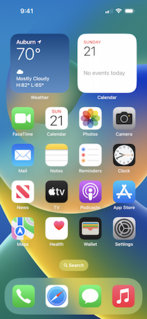
iOS is a mobile operating system created and developed by Apple Inc. exclusively for its hardware. It is the operating system that powers many of the company's mobile devices, including the iPhone; the term also included the versions running on iPads until iPadOS was introduced in 2019, as well as on the iPod Touch devices, which were discontinued in mid-2022. It is the world's second-most widely installed mobile operating system, after Android. It is the basis for three other operating systems made by Apple: iPadOS, tvOS, and watchOS. It is proprietary software, although some parts of it are open source under the Apple Public Source License and other licenses.
SpringBoard is the standard application that manages the iPhone's home screen. Other tasks include starting WindowServer, launching and bootstrapping applications and setting some of the device's settings on startup.
The version history of the mobile operating system iOS, developed by Apple Inc., began with the release of iPhone OS 1 for the original iPhone on June 29, 2007. Since its initial release, it has been used as the operating system for iPhone, iPad, iPod Touch, and HomePod. Continuous development since its initial release resulted in new major releases of the software, typically being announced at the annual Apple Worldwide Developers Conference and later released in September, coinciding with the release of new iPhone models. Starting with the 13.0 release, the operating system for iPad was split off as iPadOS. The latest stable versions of iOS, 16.0, and iPadOS, 15.7, were released on September 12, 2022. The latest beta version of iPadOS, 16.1 beta, was released on August 23, 2022.

iOS 4 is the fourth major release of the iOS mobile operating system developed by Apple Inc., being the successor to iPhone OS 3. It was announced at the Apple Special Event on April 8, 2010, and was released on June 21, 2010. iOS 4 is the first iOS version issued under the "iOS" rebranding, dropping the "iPhone OS" naming convention of previous versions. It was succeeded by iOS 5 on October 12, 2011.

FaceTime is a proprietary videotelephony product developed by Apple Inc. FaceTime is available on supported iOS mobile devices running iOS 4 and later and Mac computers that run Mac OS X 10.6.6 and later. FaceTime supports any iOS device with a forward-facing camera and any Mac computer equipped with a FaceTime Camera. FaceTime Audio, an audio-only version, is available on any iOS device that supports iOS 7 or newer, and any Mac with a forward-facing camera running OS X 10.9.2 and later. FaceTime is included for free in iOS and in macOS from Mac OS X Lion (10.7) onwards. Since the release of iOS 15, iPadOS 15, and macOS Monterey, non-Apple systems can be used to participate in FaceTime calls using a web client.

The iPad 2 is a tablet designed, developed and marketed by Apple Inc. Compared to the first iPad, as the second model in the iPad line, it gained a faster dual core A5 processor, a lighter build structure, and was the first iPad to feature VGA front-facing and 720p rear-facing cameras designed for FaceTime video calling.
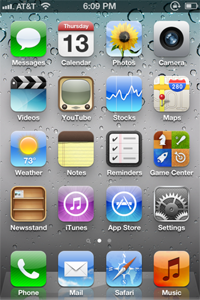
iOS 5 is the fifth major release of the iOS mobile operating system developed by Apple Inc., being the successor to iOS 4. It was announced at the company's Worldwide Developers Conference on June 6, 2011, and was released on October 12, 2011. It was succeeded by iOS 6 on September 19, 2012.

iMessage is an instant messaging service developed by Apple Inc. and launched in 2011. iMessage functions exclusively on Apple platforms: macOS, iOS, iPadOS, and watchOS.

iOS 6 is the sixth major release of the iOS mobile operating system developed by Apple Inc, being the successor to iOS 5. It was announced at the company's Worldwide Developers Conference on June 11, 2012, and was released on September 19, 2012. It was succeeded by iOS 7 on September 18, 2013.
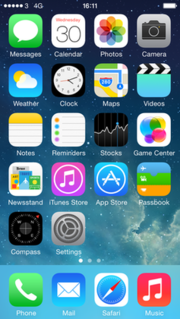
iOS 7 is the seventh major release of the iOS mobile operating system developed by Apple Inc., being the successor to iOS 6. It was announced at the company's Worldwide Developers Conference on June 10, 2013, and was released on September 18 of that year. It was succeeded by iOS 8 on September 17, 2014.

iOS 8 is the eighth major release of the iOS mobile operating system developed by Apple Inc., being the successor to iOS 7. It was announced at the company's Worldwide Developers Conference on June 2, 2014, and was released on September 17, 2014. It was succeeded by iOS 9 on September 16, 2015.

iOS 9 is the ninth major release of the iOS mobile operating system developed by Apple Inc., being the successor to iOS 8. It was announced at the company's Worldwide Developers Conference on June 8, 2015, and was released on September 16, 2015. It was succeeded by iOS 10 on September 13, 2016.

iOS 10 is the tenth major release of the iOS mobile operating system developed by Apple Inc., being the successor to iOS 9. It was announced at the company's Worldwide Developers Conference on June 13, 2016, and was released on September 13, that year. It was succeeded by iOS 11 on September 19, 2017.

iOS 11 is the eleventh major release of the iOS mobile operating system developed by Apple Inc., being the successor to iOS 10. It was announced at the company's Worldwide Developers Conference on June 5, 2017, and released on September 19, 2017. It was succeeded by iOS 12 on September 17, 2018.

iOS 12 is the twelfth major release of the iOS mobile operating system developed by Apple Inc. Aesthetically similar to its predecessor, iOS 11, it focuses more on performance than on new features, quality improvements and security updates. Announced at the company's Worldwide Developers Conference on June 4, 2018, iOS 12 was released to the public on September 17, 2018. It was succeeded for the iPhone and iPod Touch by iOS 13 on September 19, 2019 and for the iPad by iPadOS 13 on September 24, 2019. Security updates for iOS 12 continued for four years following the release of iOS 13 for devices unable to run the newer operating system.

iOS 13 is the thirteenth major release of the iOS mobile operating system developed by Apple Inc. for their iPhone, iPod Touch, and HomePod lines. The successor to iOS 12 on those devices, it was announced at the company's Worldwide Developers Conference (WWDC) on June 3, 2019, and released on September 19, 2019. It was succeeded by iOS 14, released on September 16, 2020.

iPadOS 13 is the first major release of the iPadOS mobile operating system developed by Apple Inc. for their iPad line of tablet computers. The successor to iOS 12 on those devices, it was announced at the company's 2019 Worldwide Developers Conference (WWDC) on June 3, 2019, as a derivation from iOS, with a greater emphasis on multitasking and tablet-centric features. It was released on September 24, 2019. It was succeeded by iPadOS 14, released on September 16, 2020.
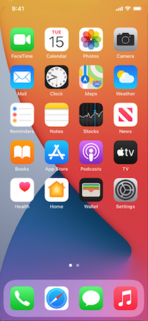
iOS 14 is the fourteenth major release of the iOS mobile operating system developed by Apple Inc. for their iPhone and iPod Touch lines. Announced at the company's Worldwide Developers Conference on June 22, 2020 as the successor to iOS 13, it was released to the public on September 16, 2020. It was succeeded by iOS 15 on September 20, 2021.
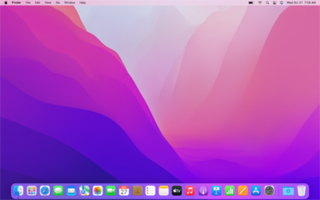
macOS Monterey is the eighteenth and current major release of macOS, Apple's desktop operating system for Macintosh computers. The successor to macOS Big Sur, it was announced at WWDC 2021 on June 7, 2021, and released on October 25, 2021. macOS Monterey will be succeeded by macOS Ventura, which was announced at WWDC 2022 on June 6, 2022.
References
- ↑ "Apple to fix DST alarm bug". The Sydney Morning Herald. October 7, 2010. Retrieved September 19, 2012.
- ↑ "iPhone DST bug causing alarms to fail across Europe (updated)". Engadget. November 1, 2010. Retrieved January 8, 2012.
- ↑ "iOS 4.3.1 Patch Imperative – Battery drain, Alarm Clock bug, Safari hole". Softpedia. March 14, 2011. Retrieved January 8, 2012.
- ↑ "PSA: iPhone alarms not working come New Year's Day 2011". Engadget. December 31, 2010. Retrieved January 8, 2012.
- ↑ "PSA: iPhone alarm clock not working again? Time to update". Engadget. January 1, 2012. Retrieved January 8, 2012.
- ↑ "Apple confirms iOS 5 bugs causing battery drain, promises a fix 'in a few weeks'". Engadget. November 2, 2011. Retrieved January 17, 2012.
- ↑ "Poll: Have you noticed battery improvements after updating to iOS 5.0.1?". Engadget. November 11, 2011. Retrieved January 8, 2012.
- ↑ "Thanks to iOS 5.1 some users lose Wifi connectivity". Engadget. November 21, 2011. Retrieved January 13, 2012.
- ↑ "Wi-Fi connectivity problems with iOS 5.1 update". Simonblog. November 27, 2011. Archived from the original on February 24, 2014. Retrieved January 8, 2012.
- ↑ "Users report SIM card issues with Apple's iPhone 4S and iOS 5.0.1". November 17, 2011.
- ↑ AppleInsider Staff (December 16, 2011). "New iOS build meant to fix iPhone 4S SIM card issues".
- ↑ "Audio echo bug plagues iPhone 4S owners during voice calls". BGR. November 1, 2011. Retrieved March 21, 2013.
- ↑ "Letter from Tim Cook on Maps". Archived from the original on October 1, 2012.
- ↑ "Apple admits iPhone 5 Maps app needs fixing" . Retrieved September 21, 2012.
- ↑ "Apple Concedes Its Errors in Maps Application; Asserts 'Working Hard' To Improve Experience; Expert Rules Out Google Maps App For iOS 6". IBT. Retrieved September 21, 2012.
- ↑ "Apple updating its Maps with user corrections every day at 3 am Eastern" . Retrieved April 19, 2015.
- ↑ "iOS 6 Bluetooth problems".
- ↑ "Will Location based reminders work on ios 6 for the IPad 3 I keep getting a message that siri can't do location based reminders on this device any help please".
- ↑ "Create and use Reminders on your iPhone and iPad - Apple Support".
- ↑ "Apple Rolls Out iOS 6.1.1 to Fix iPhone 4S Bugs". PC Magazine. February 11, 2014. Retrieved February 11, 2013.
- ↑ "Ask Ars: Why will Apple's Do Not Disturb bug fix itself next week?". January 3, 2013. Retrieved January 4, 2013.
- ↑ "iOS 6: Do Not Disturb mode stays on after scheduled time". Apple.com. January 2, 2013. Retrieved January 4, 2013.
- ↑ "Microsoft suggests throttling or blocking iOS 6.1 devices after bug slows down Exchange servers". February 12, 2013. Retrieved February 12, 2013.
- ↑ "Rapid growth in transaction logs, CPU use, and memory consumption in Exchange Server 2010 when a user syncs a mailbox by using an iOS 6.1-based device". February 13, 2013. Retrieved February 13, 2013.
- ↑ "iOS 6.1: Excess Exchange activity after accepting an exception to recurring calendar event". February 13, 2013. Retrieved February 14, 2013.
- ↑ "You Can Bypass the iOS 6.1 Lockcode Screen With This Simple Technique". February 14, 2013. Retrieved February 14, 2013.
- ↑ "iOS passcode bug slated to be fixed in iOS 6.1.3—for real this time". Ars Technica. February 21, 2013. Retrieved February 26, 2013.
- 1 2 "iOS 6 Users on Devices Able to Run iOS 7 Must Upgrade to Fix FaceTime". April 24, 2014. Retrieved April 19, 2015.
- ↑ "Apple says it's working on fix for iOS 7 lockscreen bypass flaw". Guardian News and Media. September 20, 2013. Archived from the original on September 20, 2013. Retrieved September 22, 2013.
Embarrassing discovery comes within hours of release of new software and exploits Control Center feature to hack into photos, texts and Facebook content
- ↑ Gurman, Mark (September 26, 2013). "Apple releases iOS 7.0.2 with fix for Lock screen passcode bypass flaw". 9to5Mac. Retrieved January 30, 2021.
- ↑ Craig Grannell (March 13, 2014). "How Apple's iOS 7.1 finally quelled users' motion sickness". The Guardian.
- ↑ "licobo.com" . Retrieved October 22, 2015.
- ↑ "iOS 7.1 makes everything faster – including your battery drain". 9to5Mac.
- ↑ "Safari ignores local domain". apple.com.
- ↑ "Safari can no longer address <host>.xxyyz... - Apple Support Communities". apple.com.
- ↑ "Apple promises to fix 'home screen crash' iPhone bug". CNET.
- ↑ "Apple Releases iOS 7.0.6 With Fix for SSL Connection Verification". macrumors.com.
- ↑ "iPhone 4S battery indicator stuck after upgrade... - Apple Support Communities". apple.com.
- ↑ "battery indicator stuck at 1%". apple.com.
- ↑ Prabhu, Gautam (March 12, 2014). "iPhone 5s users reporting issues with Touch ID after iOS 7.1 update". iPhone Hacks. Retrieved January 30, 2021.
- ↑ Kingsley-Hughes, Adrian. "Apple releases iOS 7.1.1". ZDNet. Retrieved January 30, 2021.
- ↑ "Bug forces Apple to delay launch of HealthKit fitness apps". CNET . Archived from the original on October 19, 2014.
- ↑ Hall, Stephen (September 24, 2014). "Apple releases iOS 8.0.1 with fixes, but many users reporting it breaks Cellular + Touch ID". 9to5Mac. Retrieved January 30, 2021.
- ↑ Kingsley-Hughes, Adrian. "Apple pulls iOS 8.0.1 update, after killing cell service, Touch ID". ZDNet. Retrieved January 30, 2021.
- ↑ "Touch ID Fails in App Store With Apples Recent iOS 8.3 Release". WCCFTech. April 9, 2015. Retrieved April 12, 2015.
- ↑ "How to Fix iOS 8.3 Touch ID Issue – iOS 8 Tips and Tricks". WCCFTech. April 10, 2015. Retrieved April 12, 2015.
- ↑ Cunningham, Andrew (November 4, 2014). "iOS 8.1.1 said to address iPhone 4S and iPad 2 performance problems". Ars Technica. Retrieved January 30, 2021.
- ↑ "iOS 8.4 includes fix for iMessage bug plaguing iPhone users". theinquirer.net. Archived from the original on May 29, 2015.
{{cite web}}: CS1 maint: unfit URL (link) - ↑ "Beware this 'fix' for nasty iOS 9 Game Center bug". Cult of Mac. Retrieved October 21, 2015.
- ↑ "What the Hell Is Going on With This 1970 iPhone Bug?". Gizmodo. Retrieved October 28, 2017.
- 1 2 "Apple apologizes for Error 53, releases fix | Cult of Mac". Cult of Mac. February 18, 2016. Retrieved October 28, 2017.
- ↑ "iOS 9.3.2 Bricking Some 9.7-inch iPad Pro Devices With 'Error 56' Message [Updated]". MacRumors. Retrieved March 22, 2022.
- ↑ Mayo, Benjamin (May 20, 2016). "Apple pulls iOS 9.3.2 for 9.7 inch iPad Pro following reports of bricked devices with 'Error 56' issue". 9to5Mac. Retrieved March 22, 2022.
- ↑ Cunningham, Andrew (June 2, 2016). "After bricking saga, Apple re-posts iOS 9.3.2 update for 9.7-inch iPad Pro [Updated]". Ars Technica. Retrieved March 22, 2022.
- ↑ Guynn, Jessica. "Apple sued for slowing iPhone 4S with iOS 9 upgrade". USA TODAY. Retrieved March 22, 2022.
- ↑ "Class Action Lawsuit Accuses Apple of Slowing Down iPhone 4s With iOS 9 Update | iPhone in Canada Blog". December 30, 2015. Retrieved March 22, 2022.
- ↑ "Apple Facing Lawsuit For Allegedly Forcing People To Buy Newer Models By Slowing Down iPhone 4s with iOS 9". January 3, 2016. Retrieved March 22, 2022.
{{cite web}}: CS1 maint: url-status (link) - ↑ "Class Action Lawsuit Accuses Apple of Crippling iPhone 4s With iOS 9 Update". MacRumors. Retrieved March 22, 2022.
- ↑ "iPhone SE Bluetooth issues". Apple Support Communities. Retrieved April 25, 2016.
- ↑ "Apple advises immediate update to iOS 9.3.5 after discovery of targeted iPhone spyware". Macworld. Retrieved May 1, 2017.
- ↑ "iPhones 'bricked' as Apple releases iOS 10 (and then rapidly fixes the problem)". Graham Cluley. September 14, 2016. Retrieved March 23, 2022.
- ↑ "iOS 10 Update Error Causes 'Plug into iTunes', Fix Requires iTunes [u] | iPhone in Canada Blog". September 13, 2016. Retrieved March 23, 2022.
- ↑ "Mysterious bug is still shutting down iPhones with 30% battery left". Clark Howard. January 25, 2017. Retrieved October 28, 2017.
- ↑ "Apple apologizes for iPhone slowdowns and offers $29 battery replacements". Anita Balakrishnan. December 28, 2017. Retrieved January 24, 2018.
- ↑ "Apple releases first iOS 11.3 Developer beta for iPhone and iPad". Zac Hall. January 24, 2018. Retrieved January 24, 2018.
- ↑ "iOS 11 Bug: Typing 1+2+3 Quickly in the Calculator App Won't Get You 6" . Retrieved December 2, 2017.
- ↑ "If you can't send an email with iOS 11 and an Outlook.com or Exchange mail account". Apple Support. Retrieved September 25, 2017.
- ↑ Samuel Axon (September 26, 2017). "Apple's iOS 11.0.1 update addresses Exchange email server issue". Ars Technica .
- ↑ "iPhones are autocorrecting the letter 'i' to an incomprehensible symbol". The Telegraph. November 6, 2017. Retrieved November 22, 2017.
- ↑ "iOS 11.1.1 is here: It fixes the autocorrect bug and a "Hey Siri" issue". Ars Technica. Retrieved November 22, 2017.
- ↑ "Date Bug in iOS 11.1.2 Causing Crash Loop on iPhones as December 2 Hits [Updated]" . Retrieved December 2, 2017.
- ↑ "Apple releases iOS 11.2.6, watchOS 4.2.3, tvOS 11.2.6, and macOS 10.13.3 supplemental update including Telugu character fix". 9to5Mac. February 19, 2018. Retrieved February 19, 2018.
- ↑ "Apple Releases iOS 11.3.1 Update With Fix for Third-Party Display Repair Issue".
- ↑ Woods, Kelly (May 24, 2019). "'FaceTime Eavesdropping Issue' in iOS 12" . Retrieved May 24, 2019.
- ↑ "Apple users claim iOS 12 is sending iMessages to the wrong contacts". Mashable. Retrieved October 25, 2018.
- ↑ Lee, Cody (June 27, 2019). "Issues restoring from iOS 12.3.2? Here are some workarounds". iDownloadBlog.com. Retrieved January 30, 2021.
- ↑ Miller, Chance (August 19, 2019). "iOS 12.4 jailbreak publicly released for modern iPhones". 9to5Mac. Retrieved January 30, 2021.
- ↑ Miller, Chance (August 26, 2019). "Apple releases iOS 12.4.1 with jailbreak vulnerability fix". 9to5Mac. Retrieved January 30, 2021.
- ↑ Statt, Nick (October 31, 2019). "iOS 13 is killing background apps more frequently, iPhone owners report". The Verge. Retrieved January 30, 2021.
- ↑ Miller, Chance (November 7, 2019). "iOS 13.2.2 now available with fix for background app performance, more". 9to5Mac. Retrieved January 30, 2021.
- ↑ Miller, Chance (November 5, 2019). "What's new in iOS 13.3 developer beta 1?". 9to5Mac. Retrieved January 30, 2021.
Early tests indicate that iOS 13.3 does solve this problem, at least to a certain degree. [...] Apparent fix for iOS 13.2 RAM management problems, though there are mixed reports
- ↑ Espósito, Filipe (October 28, 2019). "Some users experiencing bricked HomePod after updating to iOS 13.2 [Update: pulled]". 9to5Mac. Retrieved March 21, 2022.
- ↑ "New 13.2 Update Bricking Some HomePods [Update Pulled by Apple]". MacRumors. Retrieved March 21, 2022.
- ↑ Gartenberg, Chaim (June 1, 2020). "Apple releases iOS 13.5.1, patching out the Unc0ver jailbreak". The Verge. Retrieved January 30, 2021.
- ↑ September 2020, Henry T. Casey 19. "iOS 14 bugs are messing with apps — what to do now". Tom's Guide. Retrieved January 30, 2021.
- ↑ Welch, Chris (September 17, 2020). "iOS 14 switches default apps back to Apple's Safari and Mail after a reboot". The Verge. Retrieved January 30, 2021.
- ↑ Krasnoff, Barbara (September 24, 2020). "Apple update fixes iOS 14 issue with default mail and browser apps". The Verge. Retrieved January 30, 2021.
- ↑ "If iOS 14 is causing battery drain, you might need to wipe your iPhone". The Verge. Retrieved October 2, 2020.